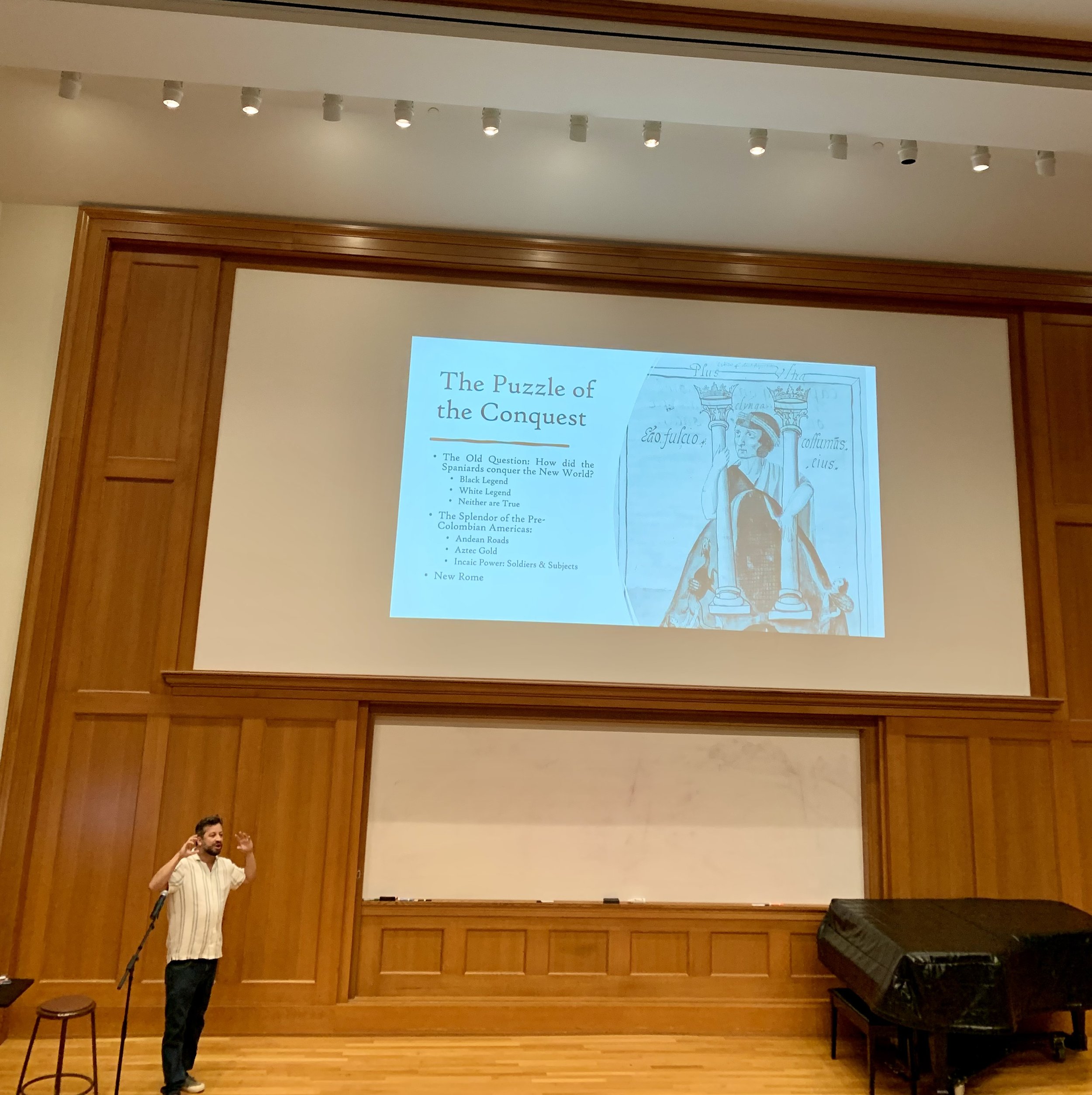Professor Pinto Handler Recounts the Forgotten History of Animals in Latin America
Professor Pinto Handler lecturing about the misconceptions of Latin American history before addressing the history of animals. Credit: Andrew Breen '25
When thinking of Latin American history, you might recall basic facts from high school, such as Aztec sacrifices or the conquistadors being seen as gods.
The journey of a pig from Spain to Guatemala and the profound ecological impacts it had for centuries likely does not immediately come to mind.
On Oct. 14, Sergio Pinto Handler, assistant professor of history and Latin American and Caribbean studies, held a lecture titled “The Other Conquerors: Animals and Humans in the Colonization of the Americas.” During the lecture, he discussed the role of animals and their relationships with humans during the conquest and colonial society of the Americas.
“The conquest of the Americas was not just a social, political or military process, but it was a process of conquest which happened due to the important role of both animals and ecological transformations,” said Pinto Handler.
The lecture offered a fascinating background of colonial and Indigenous history, before delving into various species of animals and their relationship to the time period.
Indigenous Peoples’ Day fell on the same day as the lecture, so Pinto Handler made a point to address historical misconceptions about the conquest of the Americas. For example, he mentioned the oft-cited claim of the conquistadors being viewed as gods. That’s completely untrue. Another historical misconception Pinto Handler dispelled was that smallpox blankets were intentionally distributed to kill Indigenous people.
These historical misconceptions surrounding the Spanish conquest can be grouped into two categories — the Black Legend, the belief that the Spanish acted completely in destruction and cruelty, and the White Legend, the belief that the Spanish brought unity and prosperity.
Both of these are not true, and the conquest and colonialism of the Americas is one of ranging complexities. Furthermore, the Indigenous peoples were not passive, but rather they were active forces who played major roles throughout the Spanish Empire.
If Indigenous history is full of misconceptions and forgotten roles, then animals are almost often completely excluded from the historical conversation. The rest of Pinto Handler’s lecture tackled the many species involved in the colonial world. The lecture aimed to explain that aside from the social and political ramifications of colonialism, the environmental and biological impact was just as crucial.
Pinto Handler believes that animals are excluded from history, “There’s been this long-standing assumption…that human beings made history, and they’re isolated from [their] ecological and environmental surroundings. That human beings determine history.”
The lecture focused on various species, from pigs, birds, dogs, horses, donkeys to even ants, each with their unique role during a period of phenomenal change. Due to an increasingly diverse population of Indigenous, European and African peoples, they all had unique relationships with animals.
For example, in the Caribbean, Indigenous tribes exchanged parrots as a form of diplomacy to build political and social ties. Other animals like pigs were met with differentiating views, as some Indigenous people viewed them with detestment; this was arguably a valid viewpoint due to the pigs being possible harbingers of disease that wreaked havoc on Indigenous populations.
Relationships between humans and animals varied between the Europeans and the Indigenous peoples. The Europeans viewed living beings as either human or animal, while Indigenous people viewed living beings as either wild or tame.
Despite often being portrayed as a strategic advantage of the Spanish, European animals such as horses did not only benefit the Europeans. Indigenous people like the Mapuche, of modern Chile and Argentina, quickly adapted and used horses to wage the most effective resistance movement against the Spanish for over a century.
Some animals native to the Americas conflicted with the Europeans’ goals; Pinto Handler highlighted the leafcutter ant and its destructive power against Portuguese crops in Brazil, to the point where it could annihilate crops at astonishing rates. Overall, the lecture highlighted an unrepresented portion of our world’s history of the environment and its numerous species.
“Environmental history is a very weird, new and somewhat problematic field where we really don’t know what to do with it because human agencies starts to recede more and more,” said Pinto Handler.
In a world of increasing awareness around our environment, recognizing the deep connection between human history and the species that also live on this planet seems to be a necessary, if uncomfortable, dialogue.
